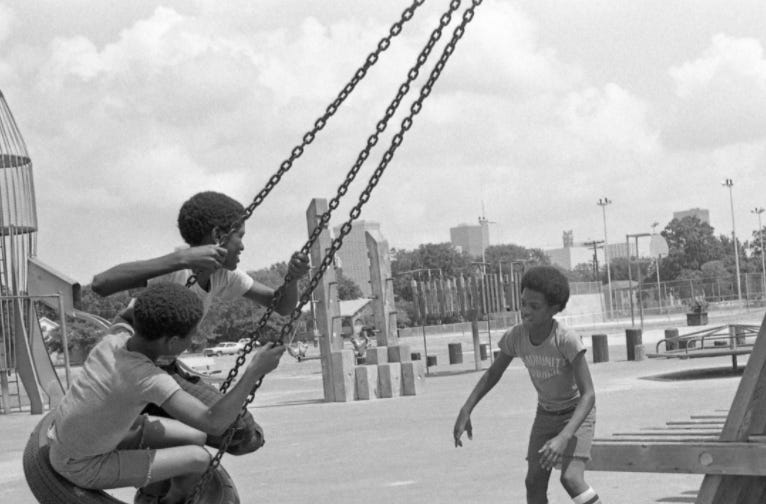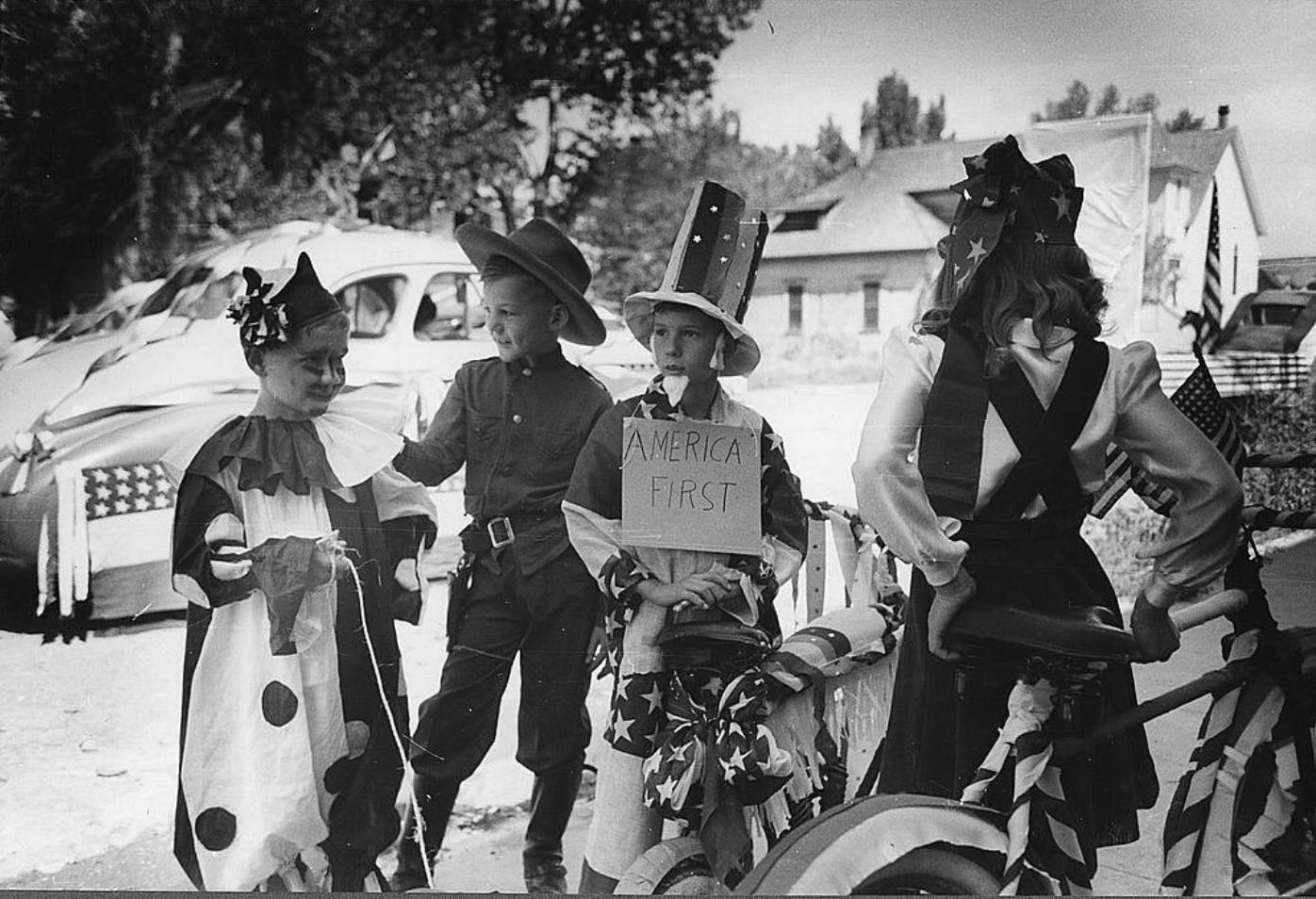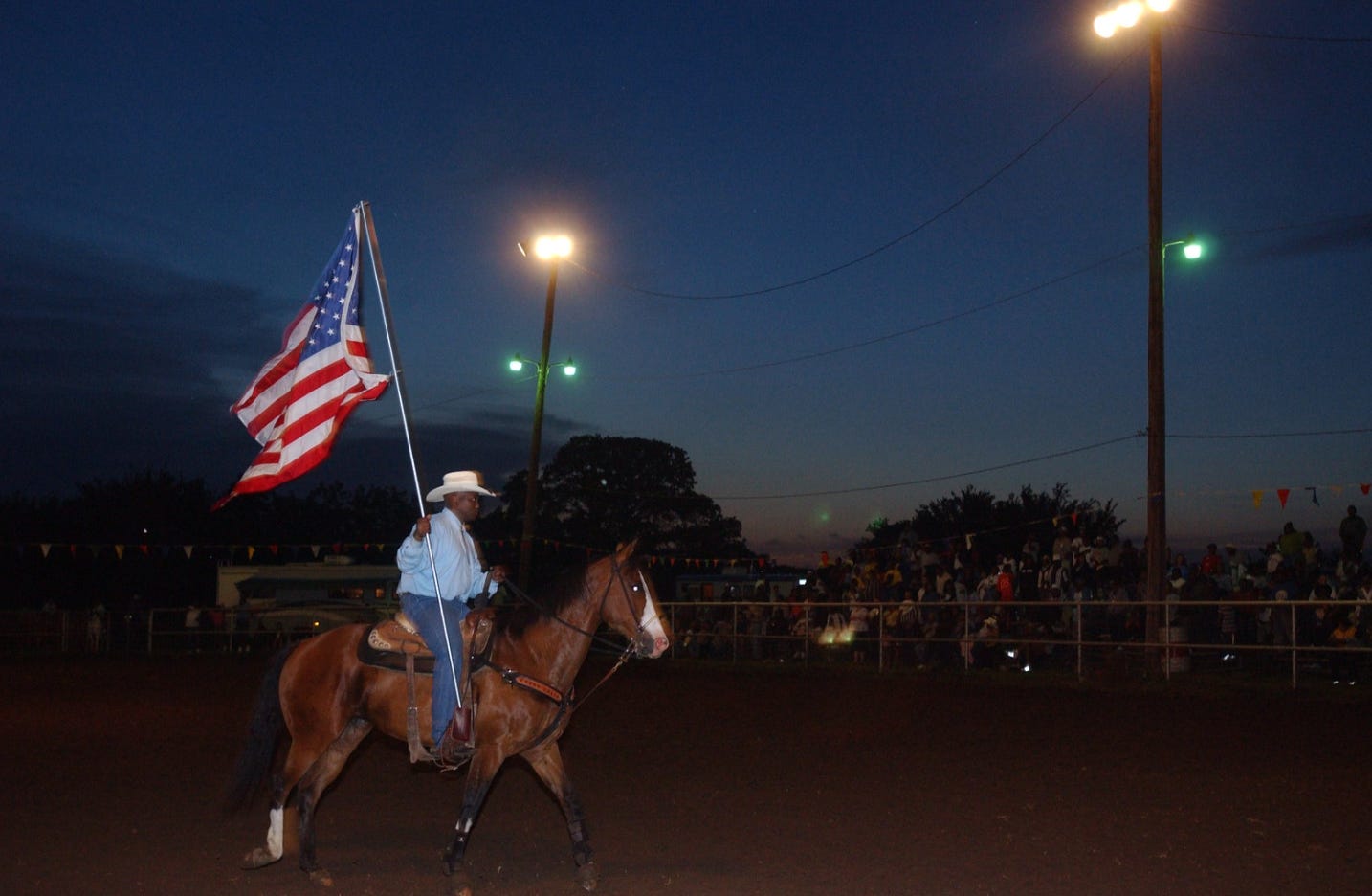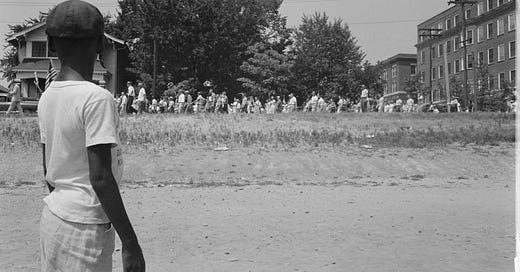You can't celebrate a freedom holiday if you can't admit that you're not free
On white people, Black celebration and how far we all have to go

Black boy watching a white mob, Little Rock (Library of Congress)
Notes: This week’s issue is about imagining better worlds and about what makes a place truly liberated. It’s dedicated to the Black Permaculture Network and others who recognize the need to rethink our relationship to community and land (oh God I can’t avoid the pun I’m so sorry)… from the ground up.
“Any real change implies the breakup of the world as one has always known it, the loss of all that gave one an identity, the end of safety. And at such a moment, unable to see and not daring to imagine what the future will now bring forth, one clings to what one knew, or dreamed that one possessed. Yet, it is only when a man is able, without bitterness or self-pity, to surrender a dream he has long possessed that he is set free - he has set himself free - for higher dreams, for greater privileges.”
-James Baldwin
Here is a story for you. Earlier this week I was buying groceries at our food co-op (you are rolling your eyes right now). I was wearing a Black Lives Matter mask (eye-rolling gets more exaggerated) and had a comically over-loaded cart because I was buying for a couple households. At some point I had to call my Dad with an extremely urgent coffee-based question. While absent-mindedly talking to him, I got further distracted by what appeared to be a rare bottle of antibacterial disinfectant on one of the end displays. I made a bee-line for those spray bottles, cart-first, and in doing so crashed head-on into a Black woman restocking the shelves. She yelled out a very appropriate “hey!” and gave me a super confused look as I moved my kale-filled battering ram away from her and blubbered a million apologies. My Black Lives Matter-emblazoned face subsequently spent far too many minutes pretending that I really, really had to price check bags of flour in a far-distant aisle.
It’s never easy being Black in America, but these days you also have to deal with all the extra White People Here To Help.

Playing in Emancipation Park, Houston (still shot from this Houston Public Media documentary)
Tomorrow will mark the Highest Level Of White Awareness of Juneteenth in American history. That’s good. We may very well be super weird about it, but knowing and celebrating and affirming is a good thing. The number of organizations and municipalities making it a holiday is an even better thing, though it makes me afraid that we’re a few years from Wells Fargo Presents: America Celebrates Juneteenth! (featuring speeches by Pete Buttigieg and a hologram MLK).
Hey, that reminds me. Want to know a fact about early Juneteenths? The Black Texans who invented the holiday lived in a state where it was illegal for them to hold public gatherings, so in Houston they had to literally pool their money together to buy the land for the park to hold a celebration. Freedom is a journey of many steps.

Fourth of July in Vale, OR (1941) Photo courtesy of the Library of Congress
I have been seeing references to Juneteenth being the Black Independence Day or the Second American Independence Day. We’ll likely hear echoes of this on the Fourth of July as well— about how that particular holiday is the White Independence Day or the White Emancipation Day. I get why it’s important to say all that that, but I also wonder if it misses the point.
You see, when I tell people I do anti-racism work with white people, the assumption is that I try to get white people to care about others. And sure, I’m definitely in favor of more caring, more empathy and less self-centeredness. But getting people to care about others isn’t actually that hard.
Here’s the actual truth of why I do what I do. I am a member of a completely fabricated group of people. Membership in that group has fluctuated over time, but the essential bargain of membership has remained the same: As long as none of us shakes the boat too much, all of us are assured an extensive list of societal benefits and advantages. While co-membership in certain class or gender groups hugely exacerbates those benefits, they’re universally available to all group members at a base level. Here’s the monkey’s paw part of that bargain though: Those benefits only come if we all work, actively and passively, to uphold a system that holds back, dehumanizes and literally kills other groups of people.
Already, that sounds like one hell of a bad bargain. It’s like the town in Ursula Le Guin’s The Ones Who Walk Away From Omelas except a million times worse because it isn’t just one child being subjected to misery so that others may benefit (side note— please read The Ones Who Walk Away From Omelas if you haven’t).
But wait, there’s more. Because here’s the deal. The end result of living in a society so committed to denying the humanity of its neighbors is that none of our institutions are actually all that effectual for any of us. We’re left with supposedly protective institutions (law enforcement) that in practice are about the exercise of cruelty and control and supposedly benevolent institutions (schools, health care) that have been so cut up and jerry-rigged to preserve privilege that you have to tie yourself into expensive, complicated knots to access them.
What I’m saying is that I live in a country where nobody is free, but where white people in particular don’t even know how far we have to go to get free.

Oklahoma cowboy (Smithsonian Institution)
I am so glad that Juneteenth is being taken increasingly seriously by white people. I’m so glad that more Americans will have the day off for it this year. But as we commemorate it, as white people, let us remember a few things:
-This is a Black holiday. It is celebration of the many steps already taken on the long walk to Black freedom.
-As it is a Black holiday, born on land that Black people had to purchase themselves to make free, it is rooted in a unique and beautiful Black understanding that the world of true liberation is still being built.
-The Fourth of July is not the white American Independence Day because white Americans didn’t become meaningfully and fully free that day. We became conditionally free, relatively free, “free” only at the expense of others.
-On Juneteenth and on all other days, if we approach racial justice work out of guilt, obligation, performance or patrony, we will merely be in the way. We also won’t be around for too long.
-Our job instead is to be simultaneously curious about ways we can be useful to the freedom struggles led by others while recognizing that our own communities are so many miles behind on the walk towards freedom.
I don’t do this work solely because it pains me to see Black men dead in the street, nor solely because it pains me to know that IHS hospitals on the Navajo Nation are overloaded with Covid patients or that there are still Central American children in cages at the border. I do this work because I believe, beyond reason, that on the other side of all the things white people will have to give up for justice is something so much more beautiful. I don’t know what actual, non-conditional freedom feels like, but I want it so badly for all our kids and grandkids, including my own.
Juneteenth is the first and only American Emancipation Day. I can’t wait for the second one, the day we all celebrate how we became free together.



